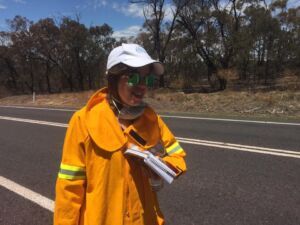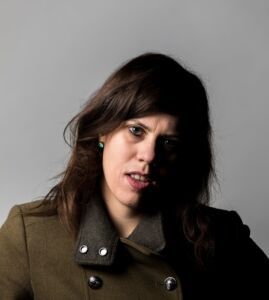Opinion
Shaking off fire fears this festive season
Lisa Martin
This article is more than 2 years old.
On her first Danish Christmas, Australian journalist Lisa Martin realised she had a mild case of pyrophobia.

“As a reporter, I frequently swapped office wear for firefighter-grade personal protective gear,” says Australian journalist Lisa Martin. Photo: Lukas Coch
We had glugged much glogg and our bellies were full of caramelised potatoes, duck and creamy rice pudding.
I was in a food coma and ready for a nap, but my Danish hosts had other ideas.
They lit candles on the Christmas tree and announced it was time to dance around it, singing Danish hymns.
I gave myself stern instructions – ‘‘Do not trip and set fire to your potential future mother-in-law’s apartment!’’ Could you imagine the wedding speeches?
I concentrated on taking careful and deliberate steps as I wondered how many Christmas trees caught fire each year* and why on earth we didn’t have a water bucket prepared.
My racing heart only calmed once we moved to the gift exchange.
*Incidentally, last year Denmark had a 35 per cent increase in house fires in December mostly from candle use.
Booze and explosives
Days later my fire fears returned.
On New Year’s Eve in Denmark, it is open slather when it comes to fireworks. Last year almost 200 Danes sustained injuries requiring hospital treatment — a quarter were aged under 15.
“It’s fine. We roster on our top eye surgeons for the night,” a Danish friend joked, as she handed around goggles at 9pm in the street.
The first rocket exploded sideways so we raced into the house shepherding small children to safety.
After we jumped off the couch and “into the new year,” I hid inside like a petrified pooch while my Danish mates joined revellers setting off gunpowder on the streets of Copenhagen.
I still don’t quite understand why fireworks are legal in Denmark. Surely minimising preventable injuries, including blindness and arm amputations, should be a top priority, even in a society with free universal healthcare.
Thankfully most of Australia sensibly leaves the pyrotechnics to sober and qualified professionals.
Consumer fireworks have long been barred in the majority of Australian jurisdictions with fines of up to AUD $27,500 (DKK 124,619) and 12 months prison for setting off illegal crackers.
Tasmania and the Northern Territory permit fireworks one night a year but newspaper headlines like: ‘Why I stuck a cracker up my clacker’ cast serious doubt over whether my fellow countrymen can be trusted to go anywhere near explosives while intoxicated.
Summertime curse
‘‘Australians are so lucky,” my Danish partner once told me. “You don’t need Christmas in December because it’s summer and you can swim and surf at the beach. Danes need Christmas. It helps us get through the dark winter months.”
But that idea of a carefree Australian summer Christmas is long gone, replaced by extreme heat, record temperatures and barbecued koalas.
Danish friends laughed in disbelief when I told them that in 2021 the temperature on Christmas Day in Perth was a scorching 42.8 degrees but many people still cooked a traditional Christmas roast for lunch.
Jaws were still on the ground when I mentioned that, thanks to global warming, Australians must factor into their holiday plans more frequent and intense bushfires, floods and cyclones.
Sometimes, Christmas celebrations are disrupted as volunteer firefighters leave their families to battle monster infernos, holidaymakers evacuate beach houses and property owners scramble to put out spotfires with hoses and buckets.
Four years ago, bushfires burnt 24 million hectares of Australian landscape (an area the size of the United Kingdom). That year we had a new take on the ‘White Christmas’ theme – thick smoke blanketing Sydney, where artist James Dive installed a Christmas tree made from a burnt bicycle and other debris from bushfire-ravaged communities to raise money for survivors.
‘Frontlines of hell’
I wasn’t always scared of fire. Perhaps I’ve seen too much of it. As a reporter, I frequently swapped office wear for firefighter-grade personal protective gear – a yellow helmet, pants and a jacket with PRESS written on the back – and headed out to report from bushfire zones.
Watching the firefighter crews on their trucks and the waterbombing aircraft in action is seeing courage on steroids. The radiant heat is like being on the frontlines of hell.
The sound of exploding gum trees never leaves you. Nor the image of a paddock full of half-burnt sheep with broken legs waiting to be put down.
Over the years, I’ve interviewed enough families made homeless from bushfires to know it’s a never-ending journey to rebuild their lives.
This festive season by all means enjoy the hygge but be safe Denmark and spare a thought for my homeland burning on the other side of the world.

About
Lisa Martin
Lisa Martin is a freelance writer who moved to Copenhagen last month. As well as reporting assignments, she’s available for copywriting, travel writing, English language event moderating and media training. For the past three years, she was a Southeast Asia correspondent for Agence France-Presse in Bangkok. www.lisapmartin.com










































